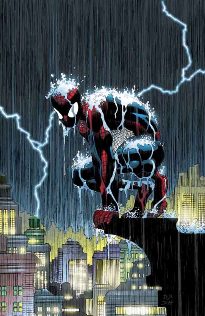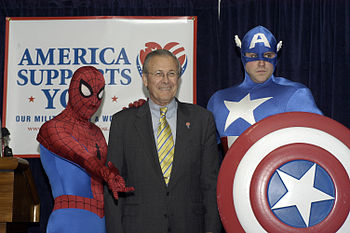I’m angry. Not like Hulk-angry, or feral Wolverine, but maybe Beast after a BAMF! gets into his lab.
I spent a jog listening to Grantland Network’s “Do You Like Prince Movies” podcast today to hear their take on Cap 2. Alex Pappademas and Wesley Morris are smart, intellectual film and culture critics who always have something interesting to say.
But I was a bit shocked how vehemently I disagree with most of the arguments raised against Captain America: The Winter Soldier.
Critical Comic Book Cool

Before I even bring those arguments up, though, let’s be clear: I didn’t expect Pappademas or Wesley Morris to hail Cap 2 as a great achievement in cinema. Captain America: The Winter Soldier isn’t Pulp Fiction. We all get that, and though Chris Nolan’s Bat-verse gives some indication of what a directorial thematic vision could do for comic book movies, that’s just not what the Marvel Cinematic Universe is going to deliver.
Though I’m a fan, I’m pretty level-headed about this. Marvel movies succeed when pre-established characters are deployed in enjoyable and familiar-yet-fresh stories. There’s no other reason. They don’t give us much by way of deeper meaning beneath the surface. There’s the character, there’s the character’s connection to a shared universe, and there’s the story. That’s it.
This has led to an unexpected dichotomy in the cultural reception of comic book movies.
On one hand, suddenly the world is catching on that nerd culture is awesome. If you listen to Chris Hardwick’s Nerdist, you’ll have heard that the nerds have won. Nerd culture is not only acceptable, it is heralded as a force to be reckoned with. Nerd culture has subsumed pop culture. The biggest movies in the world are Superman, Batman, Transformers, and the Avengers. The biggest tv show in the world is The Walking Dead (a straight comic book adaption). The biggest celebrities in the world (Robert Downey Jr, Jennifer Lawrence, Robert Redford) are associated with comics.
The nerds have won.
This is exciting, and worth celebrating, and of course also in many ways complete nonsense. Critically speaking, the nerd infiltration of pop culture has not led to a smarter product. In fact, it’s the complete opposite.
Comic book movies are now a pejorative way to quickly dismiss mindless blockbuster action. The Walking Dead is critically dissected and rejected at every turn (often not unfairly). The big time celebrities associated with comic book movies are largely seen as cash hungry.
Despite the overwhelming popularity, the serious critical thinker can’t take comic book movies as anything more than bubblegum. While it’s suddenly cool and acceptable to unabashedly like comic book movies, it’s simultaneously not that cool. While it’s not the cultural equivalent of liking Nickelback, it’s not far from the equivalent to championing Dave Mathews Band as the best music of all time. Fun in enormous drunk groups, embarrassing at Pitchfork Music Festival.
Marvel’s Illusion of Change

Now to be fair, the Grantland crew isn’t out on the comic book movie spectacle wholesale. Morris is clearly not a comic book guy, but he writes an unquestionably well-balanced account of the film and despite his (largely accurate) problems with the action sequences, ultimately enjoys the movie.
But Pappademas brings us back to the “bubblegum” problem with comic book movies, and with Captain America: The Winter Soldier, it’s a problem I just don’t see. At least not for the reasons he identifies.
Pappademas argues that Cap 2 is essentially meaningless, with no significant change or development. He cites Stan Lee’s “illusion of change” as all we really get here, asserting that every Marvel movie keeps building and building to something supposedly cooler than the thing we’re actually watching.
I find this an unfortunate self-imposed restraint towards enjoying the story. The “illusion of change” can be discussed as both a positive and a negative. On one hand, merely pretending to actually develop the story sounds like we’re being duped. Like Marvel Studios is tricking us into thinking these earth-shattering events are important, when secretly everything is as it always is, and always will be.
On the other hand, the illusion of change is what keeps a shared comic book universe with the same characters running smoothly for over 50 years. If Spider-Man actually dies, we suddenly don’t get Spider-Man stories (hang on, I’m getting a call from a Dr. Otto Octavius?). For fans of the character, that is far from a win.
As a concept, the illusion of change is immensely interesting. It is so essential to comic books, and it’s something that long-time readers are willing to accept, whether they realize they’re doing so or not.
This is only one example of many, but when Marvel retconned the developments of J. Michael Straczynski’s Spider-Man, fans HATED IT. I did too! Part of this is because the retcon was a mildly insane, out-of-character, mess of a story, but most of it was because Peter Parker had developed in important ways during JMS’s run on the character!
I’m a fan of this run on Amazing Spidey from JMS and John Romita Jr, and it’s somewhat startling how many Spider-Man tropes they upend. You realize just how static you’ve allowed Peter Parker to become over the years as they break precedent after precedent.
SPOILERS FOR SPIDEY FOLLOW!
In the span of over 75 issues, Peter stops working as a photographer and gets a job as a high school science teacher (makes tons of sense), Aunt May finds out he’s Spider-Man and doesn’t just suddenly forget (about time), and Peter Parker goes on national TV and declares to the world that he is Spider-Man (holy what?!).
These are huge developments in the illusion of Spider-Man’s universe. They allow for new thinking on the character and all sorts of new stories (even silly subsplots like Aunt May writing to newspapers scolding them for their imbalanced portrayal of Spider-Man are a LOT of fun).
Unfortunately, someone at Marvel (as Editor-in-Chief, Joe Quesada gets a lot of blame for this) panicked about losing the core Peter Parker. All of a sudden, this character was changing, right before our eyes. Marvel Comics wanted their Spider-Man back.
Enter the ret-con.
This is, of course, a problem unique to comics. As Sean Howe puts it in “Marvel Comics: The Untold Story,” writing a comic book character is temporary custodial work. You’re the curator, or care-taker of a character, but ultimately the foundation for that character lies in the 60’s, somewhere with Stan, Jack, Steve, and a whole mess of creator rights issues.
When the “illusion of change” goes wrong as it did here, what you’re left with is an eviscerating clarity that it was all truly meaningless. It was all a dream.
When you’ve invested time, money and emotions in a story, this is frustrating as hell.
Of course, that’s why it’s an “illusion.” It’s because you generally don’t see the man behind the curtain.
A better example of managing the illusion actually comes from Ed Brubaker’s “Death of Captain America” story arc. As you can tell from the title, Cap’s gonna get it. Obviously this is problematic for Marvel comics. Yes, a “Death of” story is likely to sell a lot of copies (and Brubaker’s is one of my favorites), but it also kind of means you can’t keep telling stories about that character any more.
With the Death of Cap, Brubaker, Epting and Marvel editorial found a creative and engaging way to 1) Keep the Captain America comic going after Steve Rogers death and 2) Reverse the permanence of the story without demystifying the illusion.
This is when the illusion works. It’s what Marvel Comics does and will always do.
Is Captain America: The Winter Soldier Merely Illusion?

So finally, we can address the illusion of change argument being used against Captain America: The Winter Soldier.
Here’s my biggest problem with it:
What?
Nothing changes?
I can understand this as it pertains to Nick Fury. Ok. That was a cop-out of sorts, although as a fan I’m glad it went the way it did. Obviously he wasn’t going to really be dead.
But SHIELD? Infiltrated by HYDRA and now destroyed?
Nothing changes?
Maybe I’m too immersed, but this felt significant to me. Particularly significant given the focus of the Marvel Cinematic Universe to date.
Kevin Feige and everyone involved at Marvel have shown otherworldly restraint in their releasing of characters and organizations into the MCU. They have slow-played everything (look no further than the mere 2 super powered additions into Agents of SHIELD).
But SHIELD has been the one organization that seems to link all the movies up to Avengers, during, and now after. And they just literally blew it out of the sky!
Unless we walk into Avengers 2 and SHIELD is just suddenly back in action, or if Agents of SHIELD spends a second season putting it back together (I think there are better approaches), this doesn’t feel like an illusion.
SHIELD no more feels like an actual development that will create new stories. Is Nick Fury going to stay hiding forver? Of course not. Is SHIELD going to lie dormant forever? Could be! That’s the exciting part.
Again, Marvel tells stories. Destroying SHIELD gives them an opportunity to tell more stories with a fresh lens. That’s not illusion.
That’s change.


Great posting Dave. To be honest, I would feel a little betrayed if my dead heroes suddenly came back via strange magical means. At the same time, you can only kill off so many good guys before you start to run out of them. Like Kaio said, House of M is a great way to throw things in a blender, because you know things will turn out alright in the end. The question is, can audiences forgive studios when they do it ala Professor X in DoFP? If so, Stan’s shocking admittance will find a new audiences. Like you said, SHIELD’s death feels pretty real. Let’s hope AoS doesn’t somehow mismanage a great opportunity.
I haven’t seen the movie yet, but the whole illusion of change thing, I honestly think it’s a real weakness and not a strength.
Let’s face it, it’s one of the bigger reasons why many people can’t take comics seriously. How many times did Jean Grey die in the 80s? 2 times + a clone of her? The first time it has real impact on you, the second time raises an eyebrow and at the third time you actually lose readers because they feel like their time is being wasted and it’s no longer worth it being emotionally invested.
Would Game of Thrones have the same following as it has if killed characters just came back to life the next episode?
So yeah it’s a topic I’m also very critical towards, though I have no idea how it relates to the movie. Didn’t read that review either for fear of spoilers, sorry^^ Just my 2 cents on the illusion of change situation.
Yeah, I agree with a lot of what you’re saying. It’s definitely a complicated aspect of comics, and with the death of characters in particular, it’s laughably abused at this point.
The Game of Thrones comparison is an interesting one, and I think you’re right that there’s a permanence that adds weight to everything. As a series of novels (or even the show), though, it has the benefit of an anticipated ending. It’s easier to tell one cohesive story without wiping changes off the board when you know the story ends. Obviously that’s a balancing act comics have to figure out (with varying degrees of success).
I think the illusion of change that works for me is when it pertains to elements of story, and not life & death of characters. I’d point to Dark Reign as an example of a cool “change” that we all know won’t last forever. But it provides a year or so of new, fresh stories we haven’t necessarily seen before. And of course eventually Spidey is back to feeling guilty, and Wolverine enjoys cigars, and the characters are who we know them to be. But for a year, we get to see the elements of story upended, and that can be a lot of fun.
I’ll be curious to know your take after you see the movie. Good luck dodging spoilers in the meantime!
I can agree with the Dark Reign example. I just read House of M and enjoyed it a ton. It’s absolutely clear from the get go that the situation won’t be permanent, but it’s an interesting what-if that’s exciting to explore.
When it comes to stuff like characters dying or reveiling their identity like in your Spiderman example it’s a different thing because it just feels disingenuous. Because it’s not clear from the get go that the events weren’t real and the retcon is sprung on you sometimes years later on a whim of the editors. Those are the cases that turn people off. (Incidentally the one thing I didn’t like ab out House of M was the Hawkeye costume shot at the end… I thought the whole point was that Wanda couldn’t create life or the whole premise of the story falls apart… but I go off-topic here, sorry)
I like the route DC takes with Batman for example, where a ton of stories are simply clearly marked as non-canon and they offer it as an option: “Here is another unique take on Batman, take or leave it”. That beats pretending to have one continuity but then lying and retconning stuff all the time after trying something new and people not liking it.
I actually loved the Hawkeye twist, but that’s entirely because I love the character. You’re right that bringing him back on a whim defeats the meaning of his (I would say epic) death. That scene of his death is honestly one of my favorites in comics. Admittedly, I was reading through a less jaded lens at the time.
I think the non-canon approach can be smart. The Marvel Knights Spider-Man series they recently released is a good example. 5 issues, out of canon, experimental as heck. It’s a crazy, surreal, fun read. And you wouldn’t really get the same story in continuity.
That said, I like the out of canon options as a supplement to continuity. Not necessarily as a replacement.